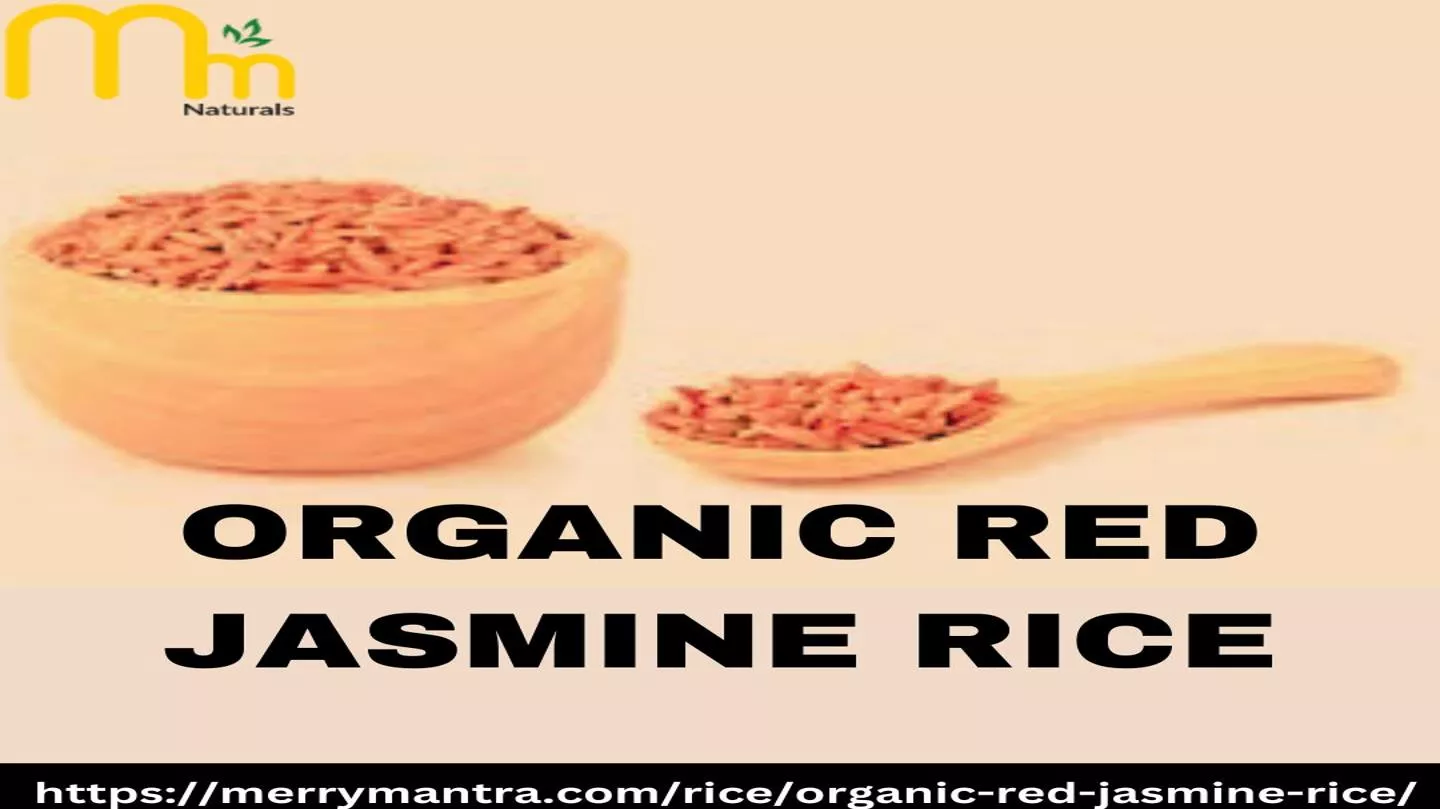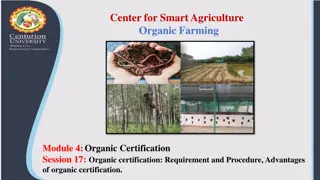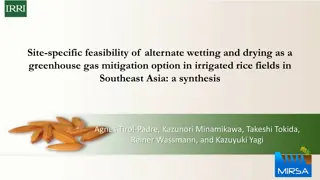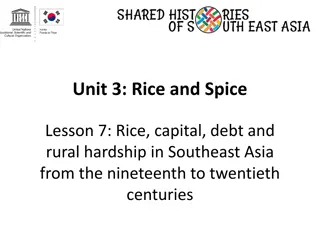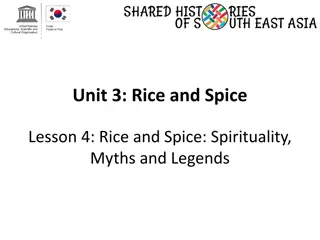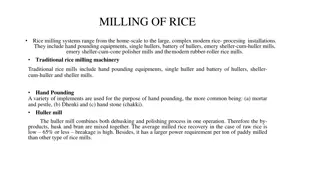Buy Organic Red Jasmine Rice Online
Nutritionally, organic red jasmine rice is a wholesome choice, providing essential nutrients such as carbohydrates for energy, fiber for digestive health, and a range of vitamins and minerals including iron and B vitamins. Its low glycemic index makes it a favorable option for those seeking to manage blood sugar levels and promote overall health.n
Download Presentation

Please find below an Image/Link to download the presentation.
The content on the website is provided AS IS for your information and personal use only. It may not be sold, licensed, or shared on other websites without obtaining consent from the author.If you encounter any issues during the download, it is possible that the publisher has removed the file from their server.
You are allowed to download the files provided on this website for personal or commercial use, subject to the condition that they are used lawfully. All files are the property of their respective owners.
The content on the website is provided AS IS for your information and personal use only. It may not be sold, licensed, or shared on other websites without obtaining consent from the author.
E N D
Presentation Transcript
Introduction Organic Red Jasmine Rice is a special variety of rice that is renowned for its distinctive aroma, rich flavor, and vibrant red color. Originating from Thailand, this unique rice has gained popularity worldwide for its nutritional benefits and culinary versatility. Unlike conventional rice, which may be grown using synthetic pesticides and fertilizers, organic red jasmine rice is cultivated using natural methods that promote soil health and biodiversity. One of the key features of organic red jasmine rice is its captivating fragrance, reminiscent of jasmine flowers, which enhances the dining experience and adds a delightful aroma to dishes. This rice variety gets its red hue from its outer bran layer, which contains antioxidants called anthocyanins, known for their potential health benefits. https://merrymantra.com/rice/organic-red-jasmine-rice/
Nutrients in Organic Red Jasmine Rice Carbohydrates: Organic red jasmine rice is a rich source of carbohydrates, providing the body with essential energy for daily activities and metabolic functions. Dietary Fiber: This rice variety contains dietary fiber, which supports digestive health by promoting regular bowel movements and aiding in the prevention of constipation. Protein: Organic red jasmine rice contains a moderate amount of protein, which is essential for muscle repair and growth, as well as for the synthesis of enzymes and hormones. Vitamins: It is a natural source of vitamins, including B vitamins such as thiamine (vitamin B1), riboflavin (vitamin B2), and niacin (vitamin B3), which are important for energy metabolism and nervous system function. https://merrymantra.com/rice/organic-red-jasmine-rice/
Minerals: Organic red jasmine rice contains various minerals such as iron, magnesium, and zinc. Iron is crucial for the production of red blood cells, while magnesium supports bone health and muscle function. Zinc plays a role in immune function and wound healing. Antioxidants: The red color of organic red jasmine rice is due to the presence of antioxidants called anthocyanins, which have been associated with various health benefits, including reducing inflammation and protecting against chronic diseases. Low Glycemic Index: This rice variety has a low glycemic index, which means it does not cause rapid spikes in blood sugar levels. This makes it a suitable choice for individuals aiming to manage their blood sugar levels or maintain stable energy levels throughout the day. https://merrymantra.com/rice/organic-red-jasmine-rice/
Cooking Methods and Techniques for Organic Red Jasmine Rice: Boiling: The most common method for cooking organic red jasmine rice is boiling. Simply rinse the rice under cold water to remove any excess starch, then add it to a pot with water (typically in a 1:2 ratio of rice to water). Bring the water to a boil, then reduce the heat to low, cover the pot, and simmer for about 15-20 minutes, or until the rice is tender and all the water is absorbed. Steaming: Steaming is another popular method for cooking organic red jasmine rice, which helps preserve its delicate texture and aroma. To steam the rice, rinse it thoroughly and add it to a steamer basket lined with parchment paper or a clean cloth. Steam the rice over boiling water for about 20-25 minutes, or until it is cooked through and fluffy. https://merrymantra.com/rice/organic-red-jasmine-rice/
Rice Cooker: Using a rice cooker is a convenient way to cook organic red jasmine rice, as it requires minimal effort and produces consistent results. Simply rinse the rice, add it to the rice cooker with the appropriate amount of water, and turn it on. The rice cooker will automatically shut off once the rice is cooked, ensuring perfectly cooked rice every time. Pilaf: Organic red jasmine rice can also be cooked using the pilaf method, which involves saut ing the rice in oil or butter before adding liquid and simmering until cooked. This technique adds flavor and complexity to the rice, making it a delicious side dish or base for a variety of recipes. Fried Rice: Leftover cooked organic red jasmine rice can be transformed into a tasty fried rice dish by stir-frying it with vegetables, protein, and seasonings. This method not only reuses leftover rice but also creates a flavorful and satisfying meal in just a few minutes. https://merrymantra.com/rice/organic-red-jasmine-rice/
Environmental Impact of Organic Farming: Soil Health: Organic farming practices prioritize the use of natural fertilizers, such as compost and animal manure, which replenish soil nutrients and improve soil structure. This promotes soil health and fertility, enhancing its ability to retain water and support diverse microbial life. Biodiversity Conservation: Organic farming methods encourage the preservation of biodiversity by minimizing the use of synthetic pesticides and herbicides that can harm beneficial insects, birds, and other wildlife. By fostering natural habitats and crop diversity, organic farms provide refuge for a variety of plant and animal species. Water Quality: Organic farming practices help to protect water quality by reducing the risk of chemical runoff and contamination of water bodies. https://merrymantra.com/rice/organic-red-jasmine-rice/
By avoiding synthetic fertilizers and pesticides, organic farmers minimize the potential for water pollution, safeguarding aquatic ecosystems and drinking water sources. Carbon Sequestration: Organic farming has the potential to mitigate climate change by promoting carbon sequestration in soils. Organic practices, such as crop rotation, cover cropping, and minimal tillage, increase soil organic matter and enhance carbon storage, helping to offset greenhouse gas emissions from agricultural activities. Reduced Energy Consumption: Organic farming often requires less energy input compared to conventional farming methods, as it relies on natural processes and renewable resources. By minimizing the use of fossil fuel- based inputs such as synthetic fertilizers and pesticides, organic farms reduce energy consumption and associated greenhouse gas emissions. https://merrymantra.com/rice/organic-red-jasmine-rice/
Thankyou for watching https://merrymantra.com/rice/organic-red-jasmine-rice/




